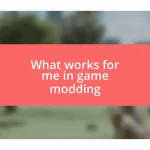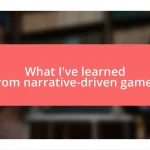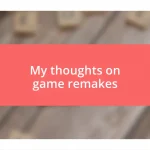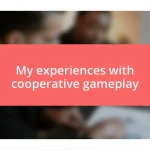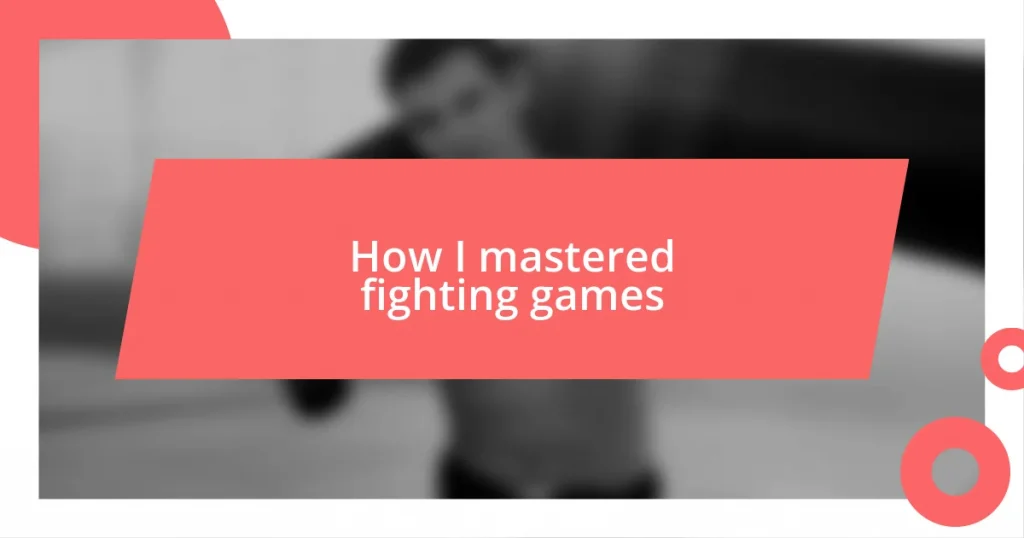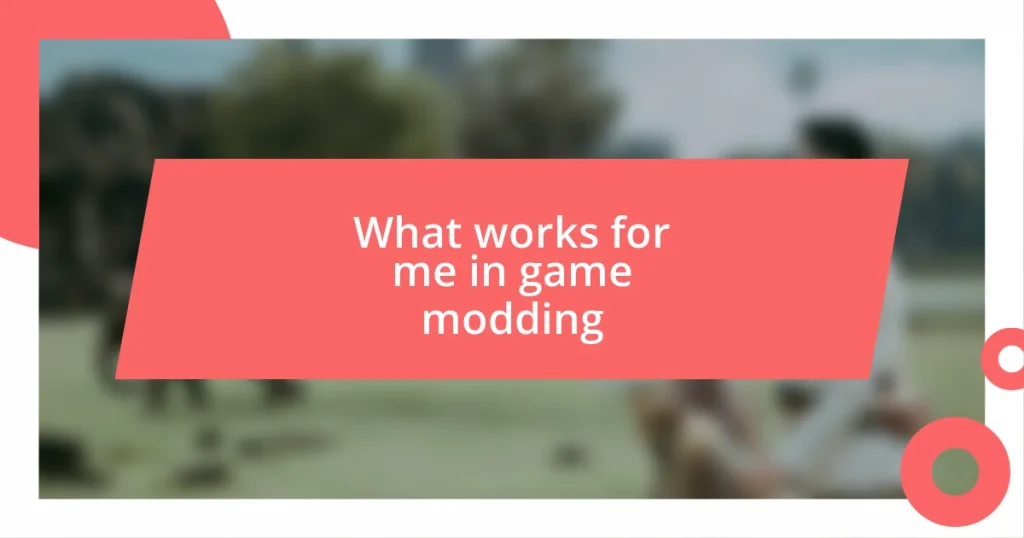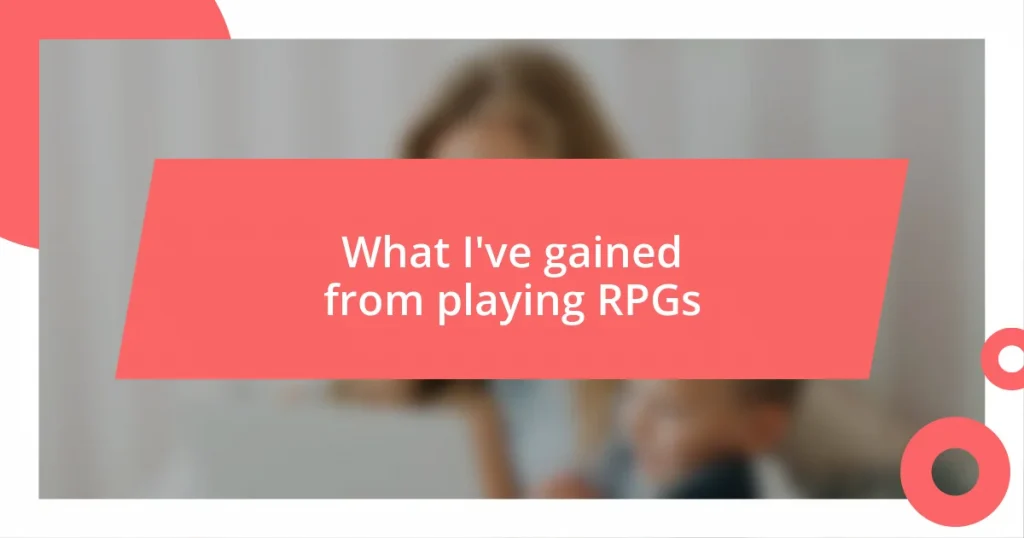Key takeaways:
- Mastering fighting game mechanics, such as timing and combos, is essential for improving gameplay and enhancing the overall experience.
- Choosing the right fighting game based on personal preferences, community engagement, and learning curve can significantly impact growth as a player.
- Analyzing gameplay and learning character matchups, along with finding a supportive community, are crucial for strategic development and overcoming challenges in tournaments.
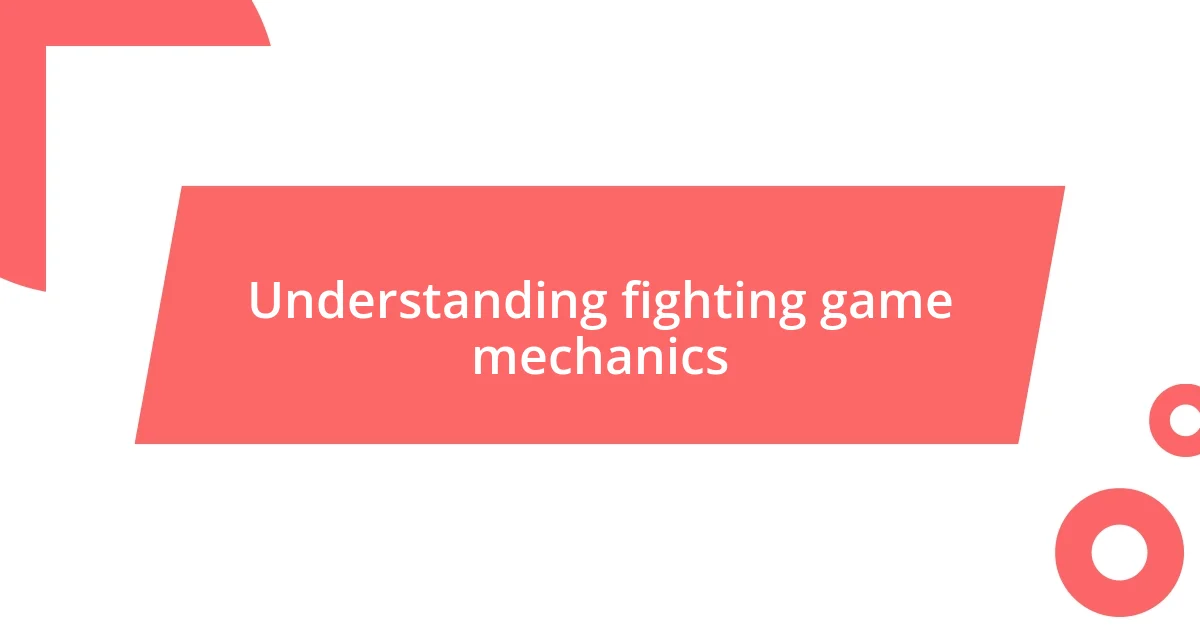
Understanding fighting game mechanics
Understanding the mechanics of fighting games is like learning a new language; it requires both patience and practice. I still remember my early days, where I’d throw random punches and kicks, hoping for a win, but realizing that each move has a purpose. It made me wonder – what if I took the time to understand my character’s abilities and how they interact with my opponent’s moves?
Timing is crucial in fighting games, and mastering it can be a game-changer. I recall a match where I barely dodged a high damaging attack because I learned to anticipate my opponent’s timing. That fierce moment taught me that knowing when to block or strike isn’t just about reaction speed; it’s about understanding the rhythm of the fight. Have you ever felt your heart race as you narrowly escaped a combo? That’s the adrenaline that comes from mastering such mechanics.
Another fundamental aspect lies in the execution of combos. There was a time when I struggled to chain moves together effectively. I started breaking down each combo into its components, practicing them in isolation. This method gave me a sense of control, and trust me, seeing those combos flow together seamlessly felt exhilarating! It’s amazing how familiarizing oneself with these mechanics transforms the gameplay experience; have you experienced that rush?
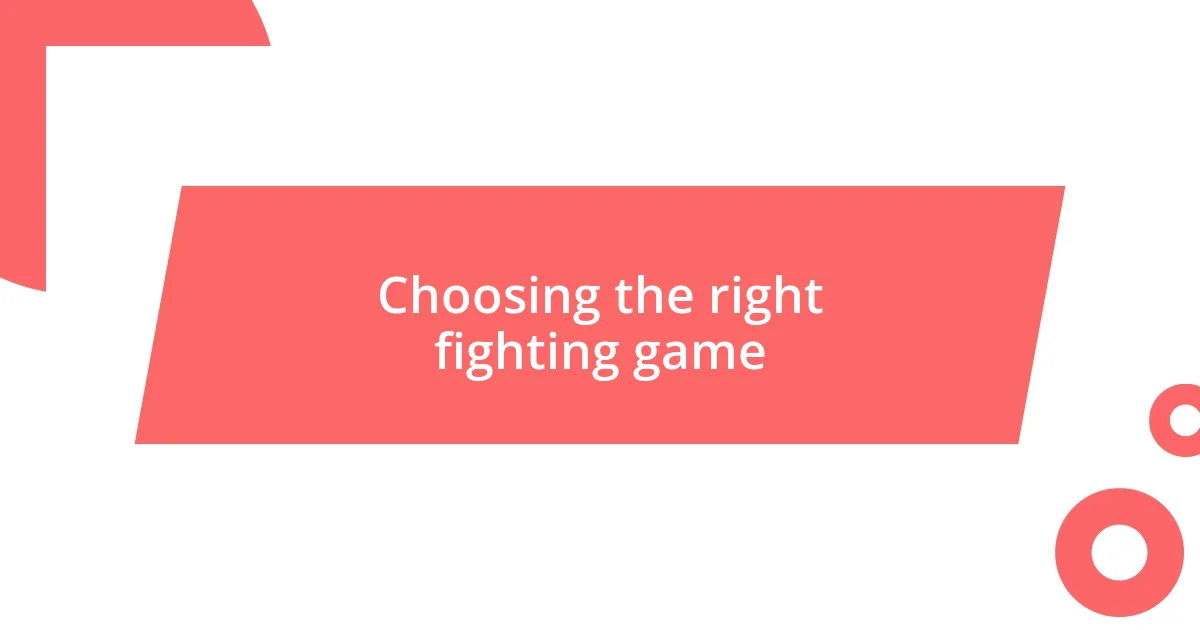
Choosing the right fighting game
When choosing the right fighting game, it’s essential to consider your personal preferences and play style. I’ve found that some games focus on high-speed action, while others offer a more strategic approach. For instance, I remember diving into “Street Fighter,” where I was drawn to its diverse character roster and intricate combos. It was like stepping into a vibrant world where each fighter had a unique story and mechanics.
Another critical factor in your decision should be the community surrounding the game. From my experience, vibrant online communities can enhance your learning journey. When I started playing “Tekken,” I joined forums and local tournaments, which fueled my passion and provided invaluable feedback. The camaraderie and competitiveness in these environments can genuinely elevate the experience and help you grow as a player.
Lastly, consider the game’s learning curve. Some titles may feel overwhelming at first, but persistence pays off. I recall my initial struggles with “Guilty Gear,” where the mechanics felt foreign. However, over time, I committed to mastering the intricacies, and the satisfaction of finally nailing a complex combo was worth it! Choosing a game that resonates with you on a personal level can make all the difference in your overall journey.
| Game | Style |
|---|---|
| Street Fighter | Diverse characters, intricate combos |
| Tekken | 3D movement, deep strategy |
| Guilty Gear | Fast-paced, combo-heavy |
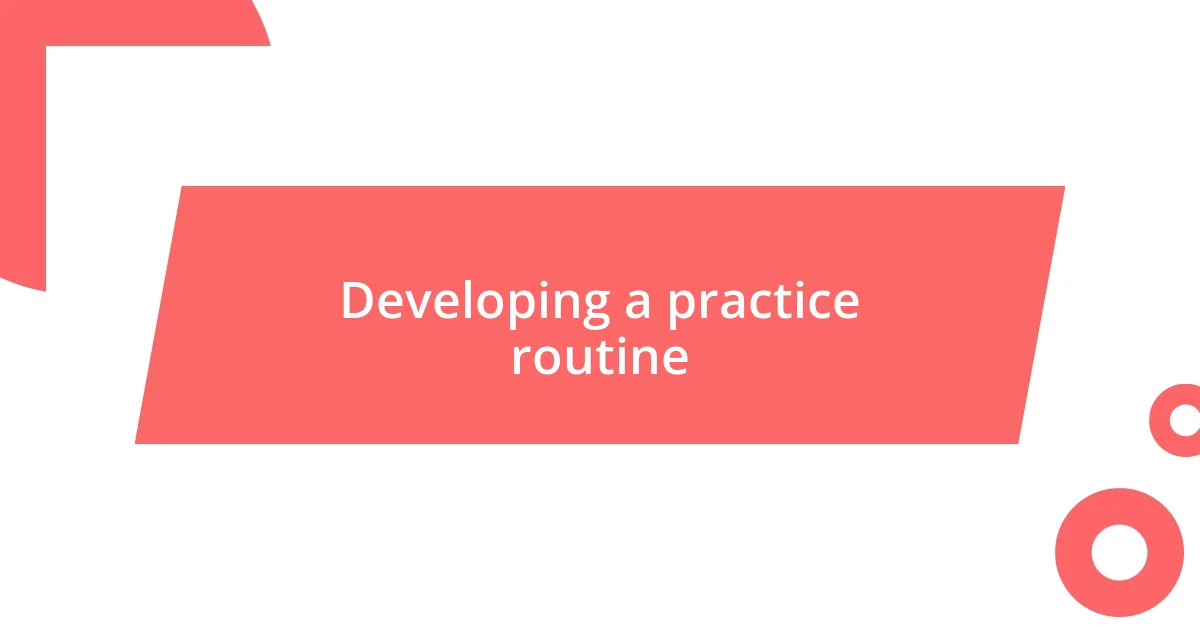
Developing a practice routine
Developing a consistent practice routine was crucial for my growth in fighting games. I discovered that merely jumping into matches wasn’t enough; I needed a structured approach to hone my skills. Early on, I dedicated specific days to focus on certain aspects, like combos on one day and defense another. This made my practice sessions feel less daunting and more rewarding, as I could track my improvement over time. I remember feeling a sense of accomplishment each time I perfected a tricky combo—it motivated me to push further.
Here’s a breakdown of elements to consider when crafting your practice routine:
- Focused Sessions: Dedicate time to practice specific skills, like combo execution or timing.
- Mix It Up: Balance your practice between offense, defense, and character-specific techniques.
- Review and Reflect: After each session, I found it helpful to reflect on what went well and what didn’t. This insight shaped my next practice endeavors.
- Set Clear Goals: Establish short-term and long-term goals to keep your motivation high.
- Stay Flexible: Adapt your routine based on your progress and the challenges you encounter.
I learned that flexibility is just as important as structure; sometimes, I’d feel particularly stuck on a technique, and shifting my focus for a day or two would reignite my enthusiasm and provide clarity. It’s all about finding that sweet spot between consistency and adaptability.
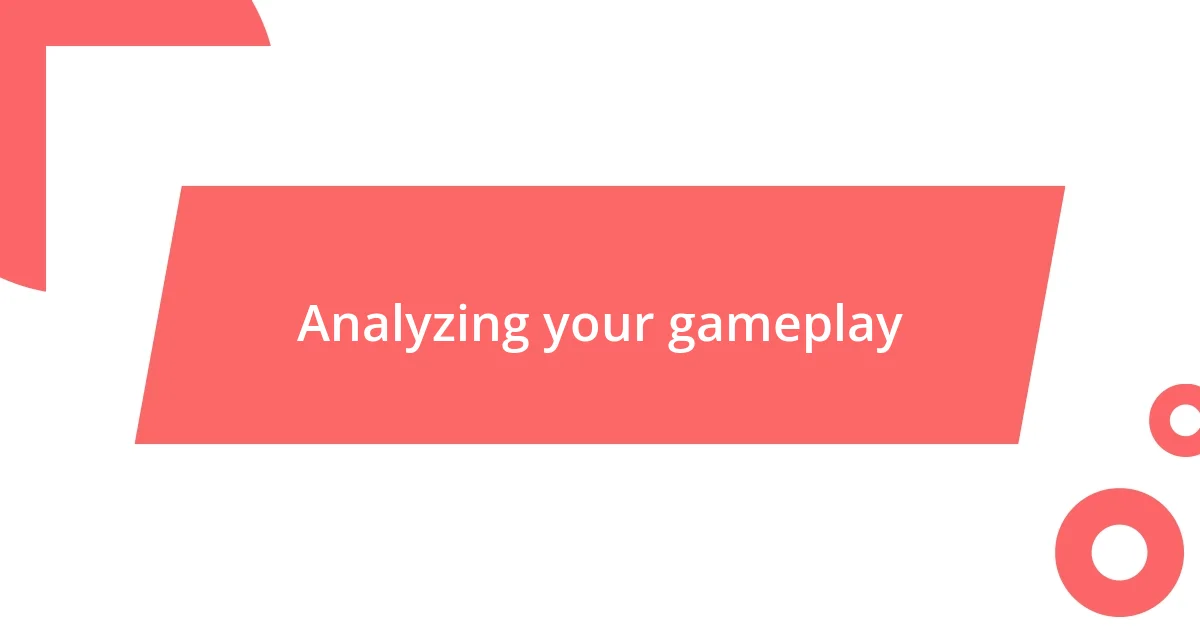
Analyzing your gameplay
Analyzing your gameplay is a critical step that I often overlooked at first. I used to jump straight into matches without reflecting on my performance afterward. One day, after a particularly frustrating session, I decided to record my gameplay. Watching those replays opened my eyes to so many mistakes I was making. It was a humbling experience, yet incredibly enlightening. Have you ever watched your matches back and realized just how much more there is to improve? I know I have, and it’s truly where the magic of growth happens.
As I analyzed my gameplay, I began to notice patterns in my habits. For instance, I was overly aggressive in some matches, leaving openings for my opponent to counterattack. Recognizing this helped me shift my mindset toward a more balanced approach. It was like flipping a switch; suddenly, I felt more in control rather than just reacting to my opponent’s moves. I found it beneficial to jot down key takeaways after each session. This simple act of reflection helped me focus on specific areas to improve, rather than feeling overwhelmed by everything I needed to work on.
I also started to seek feedback from others, which was a game-changer. I remember sharing clips with fellow players who offered constructive criticism. Their insights often revealed aspects I hadn’t considered—like my spacing or timing in matches. It made me wonder: am I really as good as I think I am? Engaging with the community in this way not only helped me refine my skills but also fostered a sense of camaraderie. It’s amazing how analyzing your gameplay can lead to deeper connections with other players while simultaneously pushing your own limits.
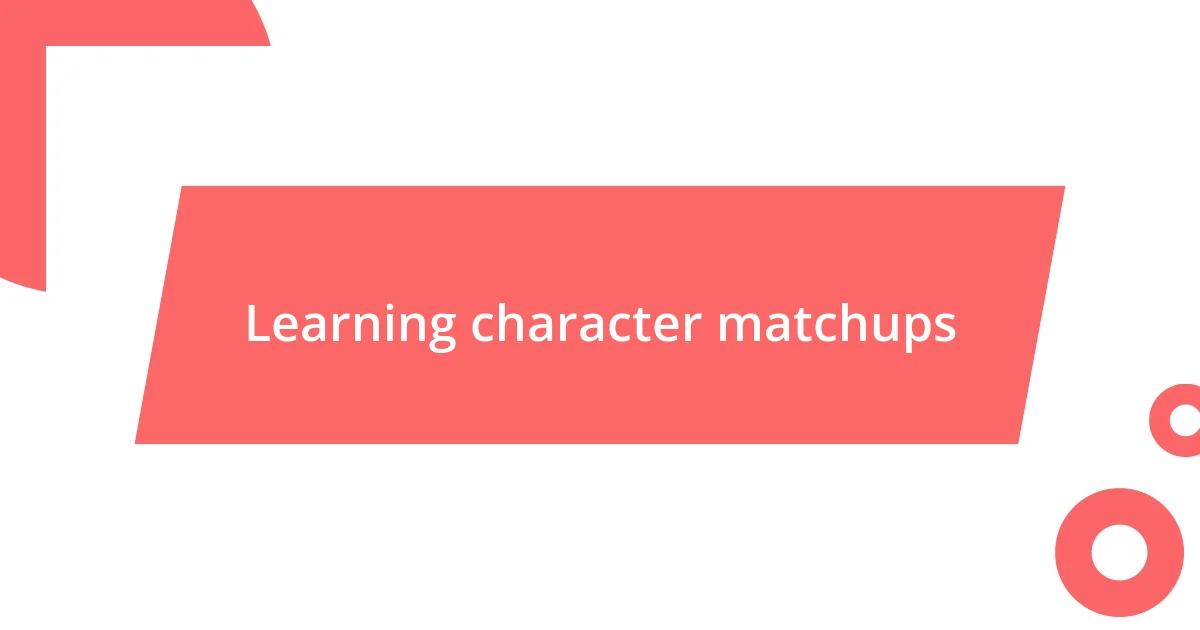
Learning character matchups
Learning character matchups is one of those aspects of fighting games that fundamentally reshaped how I approached competition. At first, I saw each character as just a collection of moves, but over time, I realized that knowing how my character fared against others was crucial. I still remember a tournament where I faced a Zangief player who utterly dominated me. I had to accept that my lack of knowledge about grapplers led to my demise. Have you ever faced an opponent and thought, “If only I had known that beforehand”?
As I dived deeper into character matchups, I created a personal database of strengths and weaknesses for each fighter. This included everything from combo possibilities to spacing and punish options. I remember the first time I switched my strategy against a Ken player; instead of getting caught in his barrage of attacks, I started using my character’s zoning abilities. The feeling of overcoming a challenging matchup is exhilarating; it’s like unearthing a hidden treasure of skill that was always there. I kept a journal where I noted down which moves were effective against specific characters, making it a handy reference as I prepared for future matches.
Understanding matchups also had an emotional component for me. There’s a certain thrill in discovering something that shifts the odds in your favor. I still recall when I finally cracked the code against a fierce rival who favored a low-profile character. I felt a rush of confidence every time we faced off afterward—it was more than just learning; it was about engaging in a battle of wits. Connecting the dots between character strengths and my own gameplay not only deepened my tactical approach but sparked a passion for strategizing that kept me invested in improving. How have you adapted your play style to counter specific matchups?
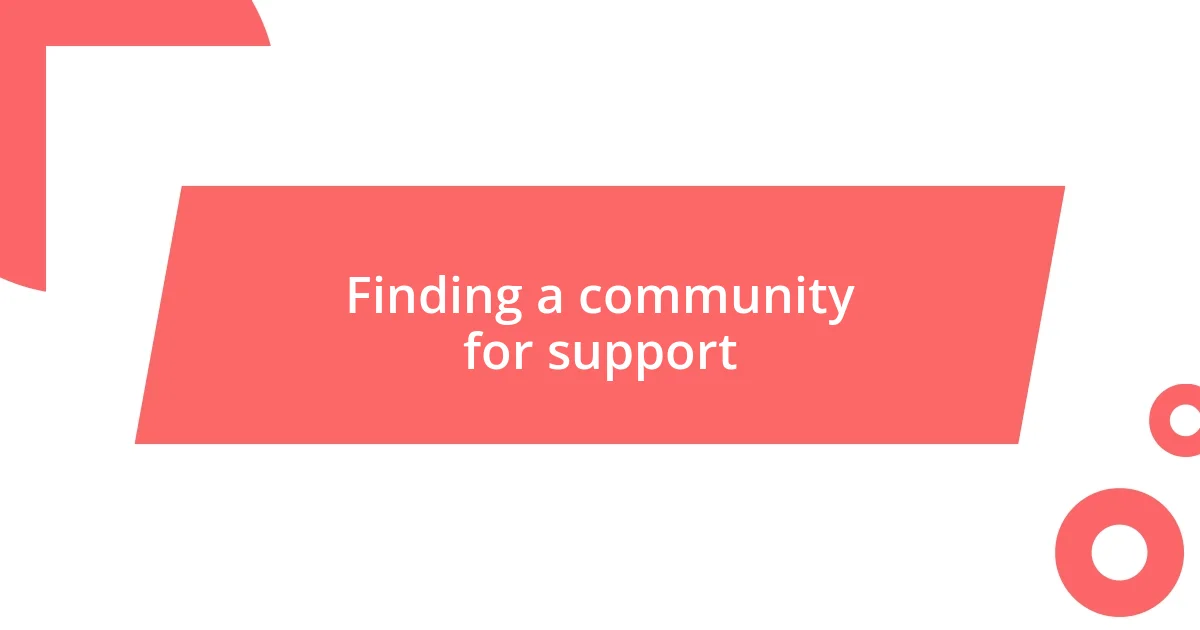
Finding a community for support
Finding a community for support has been one of the cornerstones of my journey in fighting games. When I first started playing seriously, I felt a bit isolated, diving into strategies and practice modes alone. However, joining online forums and local meetups opened up a world of shared experiences. The moment I chatted with someone who understood the struggles of a newbie, I felt a sense of belonging. Have you ever found comfort in a group that shares your passions? I know I have.
In particular, I remember attending a local tournament where I met a group of players who quickly became my allies. We started sharing tips and tricks, and before I knew it, I was part of a tight-knit community. I also discovered that practicing with others not only improved my skills but also boosted my confidence. Engaging with different players taught me new strategies that I had never considered during solitary sessions. It’s incredible how much support is out there; all you need to do is ask and connect!
I’ve even seen friendships blossom from these gaming interactions. One of my closest friends today is someone I met through a Discord group. We would spend hours analyzing our gameplay, sending each other clips, and even streaming our sessions. The encouragement from that community kept my motivation high, especially during tough phases when I felt like giving up. Have you ever leaned on friends during your gaming struggles? I certainly have, and it made all the difference in pushing through those challenging moments.
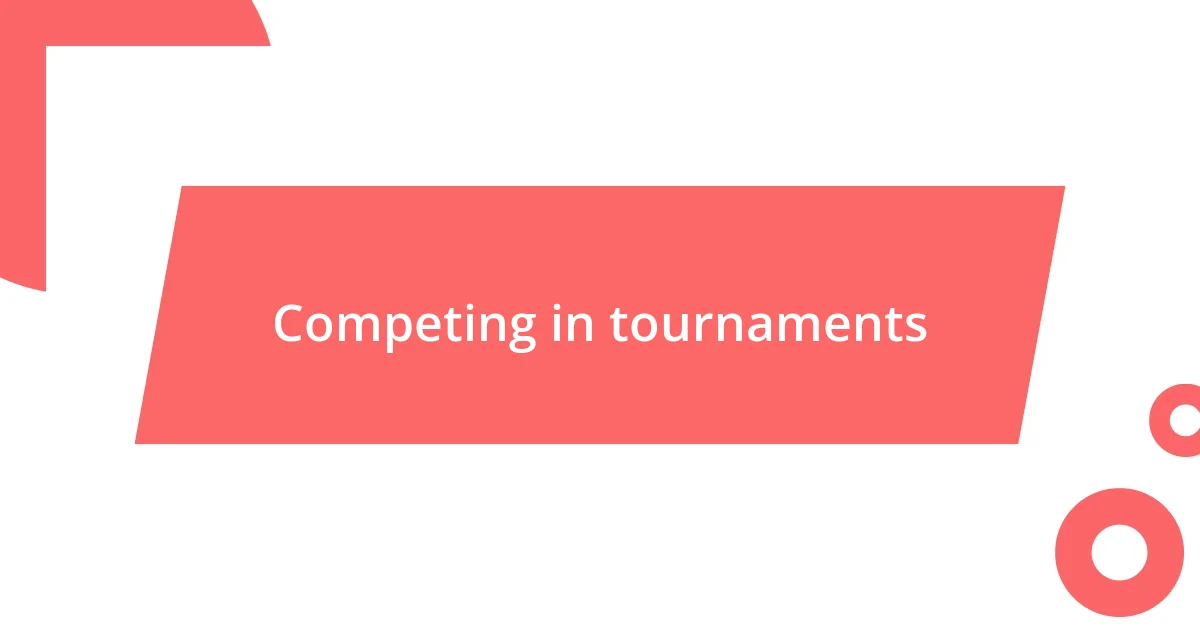
Competing in tournaments
Competing in tournaments has been a rollercoaster of emotions for me. I still recall my first big tournament; nerves were coursing through my veins as I stepped into that venue crowded with skilled players. The air was thick with anticipation, and I remember asking myself, “What if I freeze up?” It turned out that adrenaline became my ally. Each match was a mix of fear and excitement, reminding me why I loved battling it out in the first place.
As I honed my skills, I began to appreciate the unique atmosphere of tournaments. There’s a palpable energy that pulls everyone who shares a love for the game together. I often found myself learning just as much from watching others as I did from competing. A moment that stands out was when I observed a top player expertly executing a flawlessly timed counter. I couldn’t help but think, “That’s the level I aspire to reach someday.” This desire to improve alongside others fueled my determination to keep entering these competitions.
One of the most significant lessons I’ve learned in tournaments is the importance of adaptability. Early on, I would get too fixated on my predetermined strategies and found myself struggling against unexpected tactics. During one chilling elimination match, I faced an opponent who switched characters mid-game, leaving me bewildered. It was a wake-up call! I realized that being adaptable and thinking on my feet can make all the difference. Have you ever found yourself in a scenario where you had to rethink your entire approach? For me, that moment reshaped how I prepared for tournaments moving forward.

